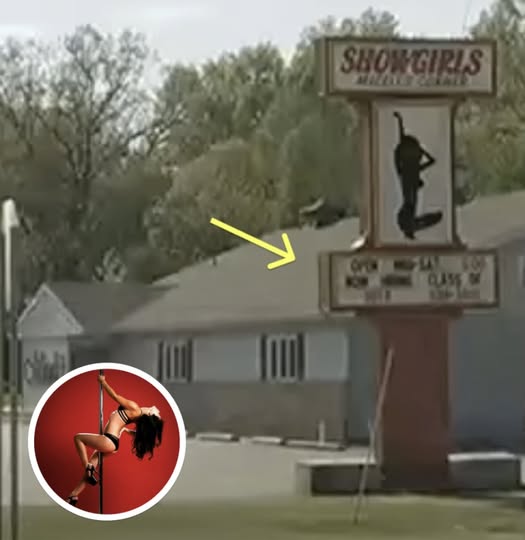A topless bar in Harrison, Michigan, has come under intense criticism after posting a controversial hiring sign that appeared to target newly graduated high school students. The message, displayed prominently outside the club, read:
“Now Hiring Class of 2016 — Gorgeous, Confident, and Talented Women Who Can Own the Dance Floor.”
The sign, belonging to Miceli’s Corner, quickly went viral after residents began sharing photos of it on social media. The slogan might have been meant to grab attention, but many locals saw it as tasteless and predatory — a direct appeal to teenagers who had just finished high school, some of whom were barely 18.
For many in the small Michigan community, the message crossed a line. Parents, educators, and local leaders condemned the sign for what they saw as an inappropriate attempt to recruit young women into adult entertainment. One resident described it as “disgusting and exploitative,” accusing the business of “sending the wrong message to girls about their worth and potential.”
“I drove past it with my daughter, and she asked what it meant,” said one frustrated parent. “How do you explain that to a teenager who just graduated? It’s not funny — it’s disturbing.”
Although the sign did not technically break any laws — Miceli’s Corner operates legally as an adult entertainment venue — the public backlash was swift and widespread. The lack of any disclaimer about age restrictions or legal work requirements added to the outrage, as many believed the sign deliberately blurred those lines for shock value and publicity.
Local mother Lisa Mulholland told reporters that while she didn’t personally oppose the club’s existence, she found its advertising deeply irresponsible.
“They’re good people, I know the owners,” she admitted, “but that sign was just wrong. It sends the message that graduating high school means you should take off your clothes for money. I don’t think it’s right at all.”
Another resident, Lisa Dickerson, agreed. “Children fresh out of high school shouldn’t be taking their clothes off for money. I think it’s sickening. There’s nothing funny about that kind of message.”
In response to mounting criticism, the club issued a brief statement to WNEM-TV, saying the sign was intended as a joke. “In no way were we trying to offend anybody,” the owners said. “The sign was simply a joke to attract attention.”
But for many, the apology rang hollow. Social media users accused the club of backpedaling only after realizing the damage had already been done.
“If you’re going to joke about something, at least make it clever,” wrote one Facebook commenter. “There’s nothing clever about inviting high school graduates to strip for cash.”
Others defended the club’s right to free expression, calling the outrage overblown. “It’s marketing — and it worked,” one person commented. “Everyone’s talking about them now.” That divide only intensified the debate, with one side calling it harmless humor and the other calling it an example of tone-deaf, sexist advertising.
Local officials weighed in as well. While confirming that the sign did not violate any city ordinances or state laws, several leaders said it was “deeply inappropriate” and urged local businesses to use better judgment when advertising publicly. “There’s a difference between grabbing attention and being offensive,” one council member said. “Miceli’s Corner missed that line by a mile.”
The controversy opened a broader conversation across the state about advertising ethics and the boundaries of free expression for adult businesses operating near family communities. Harrison, a small town with a population of around 2,000, is not accustomed to national attention. Yet within days, the photo of the “Class of 2016” sign was being shared by major outlets and sparking heated debates online.
The sign’s viral spread also reignited discussions about the sexualization of young women in media and the responsibilities of adult venues to maintain community standards. “Even if they didn’t mean harm, the impact is real,” said one local counselor. “Teen girls already face enormous pressure about body image and self-worth. Seeing a sign like that reinforces the wrong ideas about what empowerment means.”
For older residents who have lived in Harrison their whole lives, the controversy struck a personal chord. “We’ve always been a small, tight-knit community,” said one longtime local. “This kind of stunt makes us look bad. There’s no place for that kind of humor here.”
Miceli’s Corner has operated since the 1970s, describing itself as a “laid-back and welcoming venue” where “the girls take your mind off your daily troubles” while guests enjoy “great music and friendly service.” The club’s website and promotional materials emphasize an “adult-only but respectful” environment, but its latest stunt has overshadowed that image entirely.
In the wake of the backlash, the owners reportedly removed the sign within a few days, replacing it with a generic “Now Hiring” message. Despite the change, screenshots of the original message continue to circulate online, often accompanied by sarcastic or outraged captions.
The situation has become something of a cautionary tale for small businesses. Marketing experts weighed in, noting that in the age of viral outrage, even local advertising can have global consequences. “A small sign on a rural highway can be seen by millions in hours,” said one analyst. “Once it’s online, you can’t control how people interpret it. Businesses, especially those in controversial industries, need to think two steps ahead before they try to be provocative.”
While some residents have since moved on, others are still calling for accountability. A few parents have petitioned the city council to introduce stricter guidelines for adult business advertising within town limits, arguing that such messages should not appear in public spaces accessible to minors.
Others, however, see the incident as a momentary lapse in judgment rather than a moral catastrophe. “I think they just didn’t think it through,” said one man who frequents the club. “It was dumb, yeah, but not evil. They apologized — we should move on.”
Still, the incident highlights how quickly humor in advertising can cross into offense, especially when it touches sensitive topics like youth, sexuality, and gender roles. What might once have been dismissed as a “bad joke” in a pre-digital era can now spiral into national outrage within hours.
In the end, the story of Miceli’s Corner isn’t just about one bad sign. It’s about the balance between freedom of expression and community standards — and how even a few poorly chosen words can set off a firestorm.
For many in Harrison, the controversy has become a reminder that words matter, intentions don’t always excuse impact, and in the age of social media, every joke is one camera click away from going global.
As one resident summed it up: “You can’t hide behind ‘it was just a joke’ anymore. If it offends an entire community, maybe it’s time to rethink what’s funny.”



